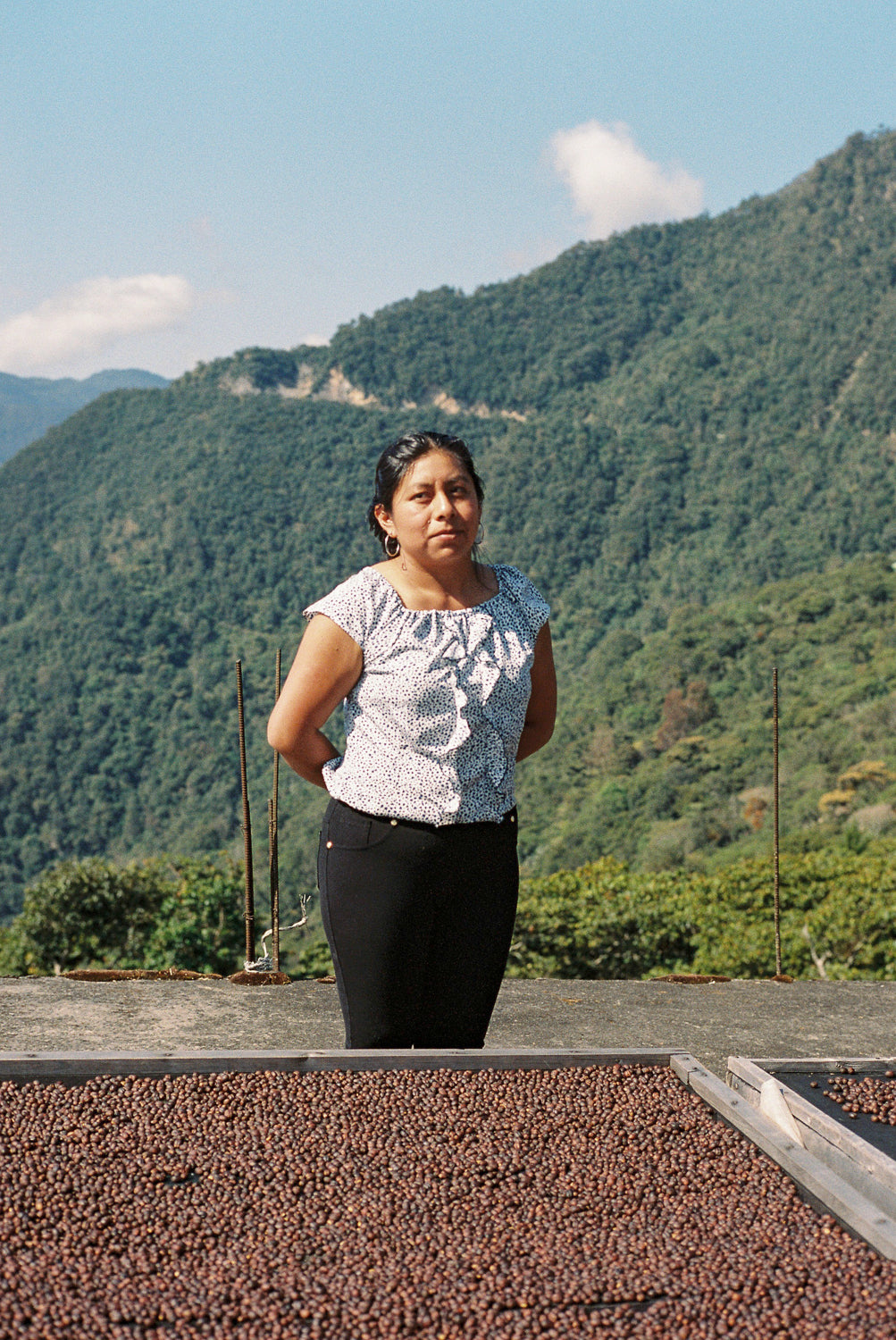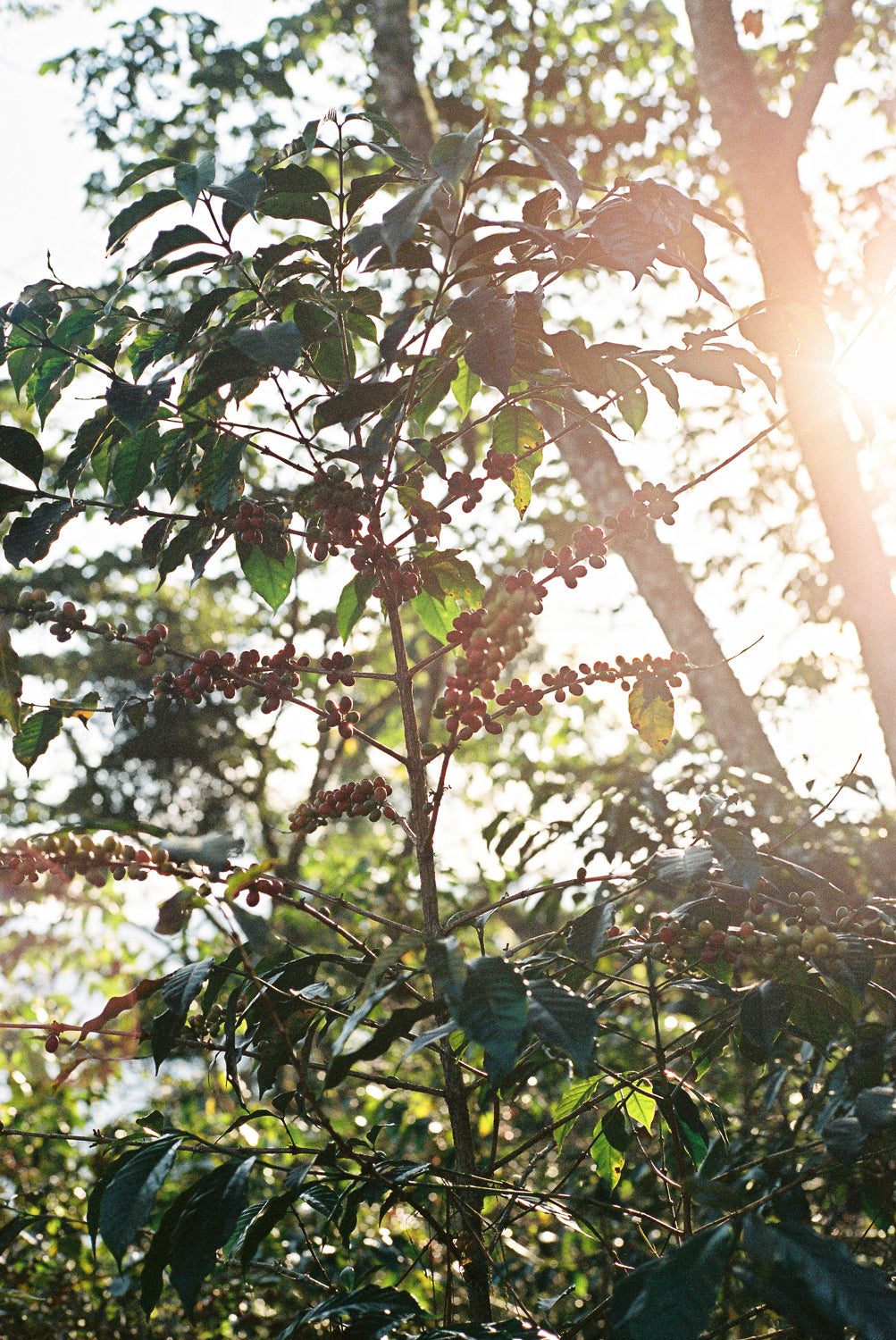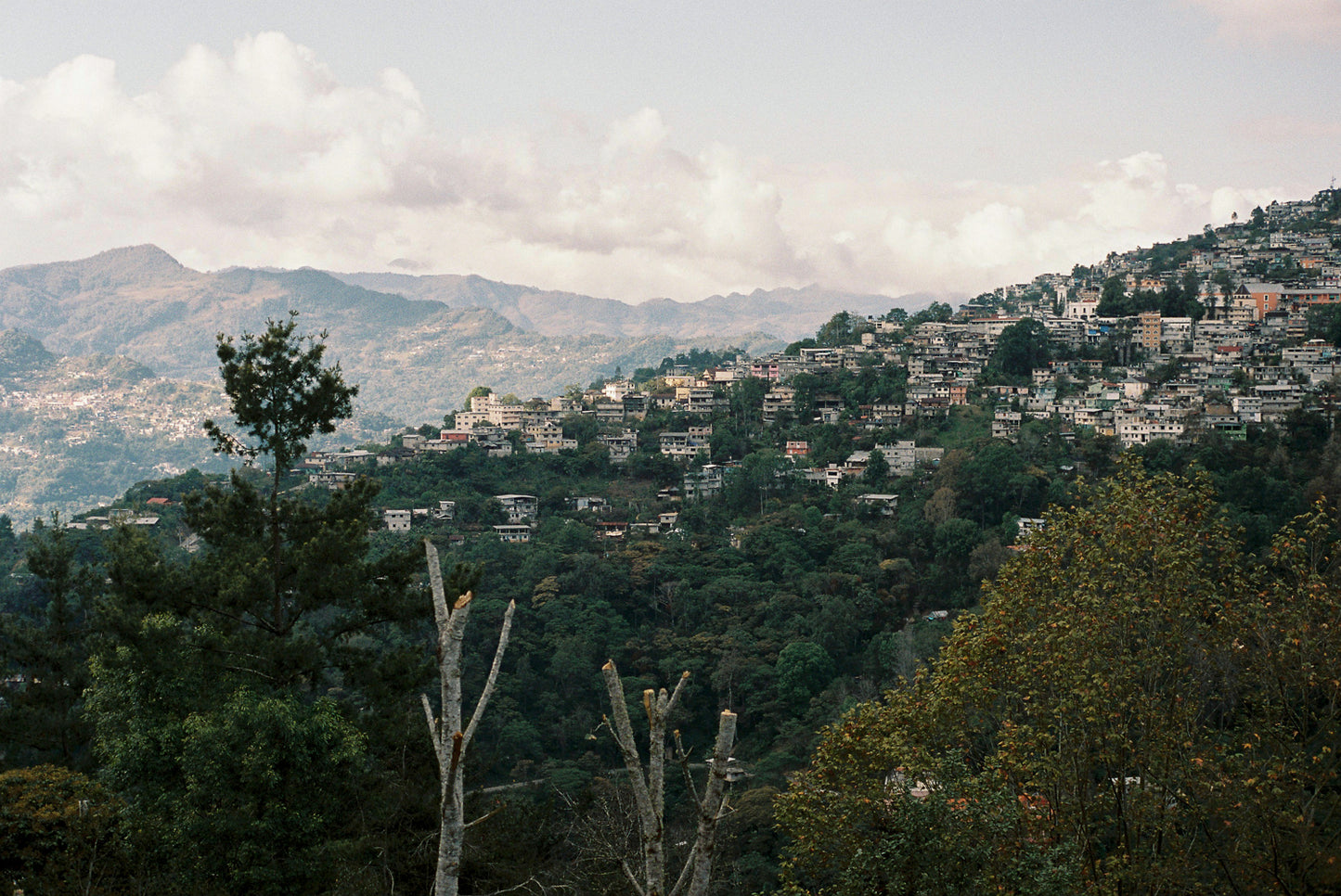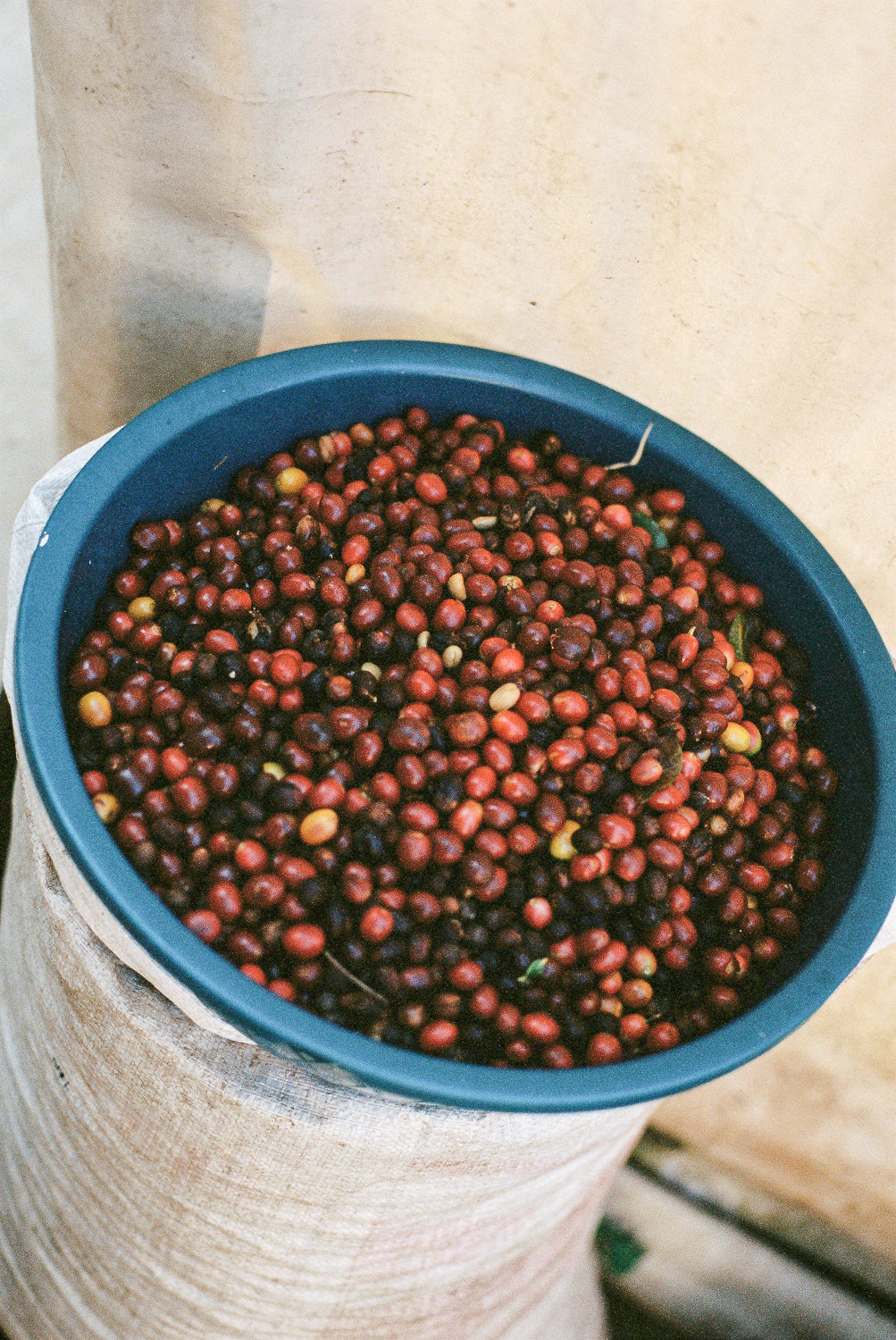Drip Roasters
Mexico Maricela
Mexico Maricela
The coffee we ship is usually roasted within the last two weeks.
This full-bodied coffee is sweet like candy, full of ripe fruit notes and yet super clean and juicy. We think of cherry, mango, red berries and grapes, but also sweet dried fruit like dates.
After the harvest, the coffee cherries go through roughly 60 hours of anaerobic fermentation, before being dried on a patio for several weeks.
In many parts of Mexico, it is still very unlikely that a woman would be in charge of a coffee farm or even work in fields other than cooking, cleaning, childcare or harvesting crop in the fields. Some women, however, are taking action to change this. One of them is Maricela Esperón, a coffee grower and land owner in the Sierra Mazateca, northern Oaxaca, in her mid-thirties.
We have published a blog post on our visit to Mexico and the Sierra Mazateca in early 2023.
Process: Natural, Anaerobic Fermentation
Varieties/Cultivars: Caturra, Typica, Mundo Novo
Altitude: 1300 masl, 18.1°N
Cup Profile: Cherry, Mango, Grape
Share






Price Transparency
We paid an FOB price of $8.5/lb for this coffee, which is 425% of the Fairtrade minimum price. Find out what this means here.
El Sótano
Farm: El Sótano
Producer: Maricela Esperón
Purchasing relationship: 3
years
Region: Sierra Mazateca
Altitude: 1300 masl, 18.1°N
According to Mazatec traditions, land is inherited to the youngest son, thus the land of Maricela's grandfather was supposed to be inherited to her father. However, since he himself only had daughters and no sons, his father decided to give the land to his other sons instead. Maricela's family was left with nothing. They had to work and saved up enough money to buy their own land and thus managed to get back into coffee farming.
When we visited their farm El Sótano, which is not too far away from the region's biggest town Huautla de Jiménez, the family invited us to their house, cooked food for us and shared their ideas about coffee farming. The family runs the farm together with Maricela being the main decision maker. Their coffee trees grow in a healthy agroforestry system alongside oak, cedar, cuajuinicul and mandarin trees, amongst others, which provide shade, increase biodiversity, and keep the soil healthy. They work with organic fertilizer and composting and count on traditional coffee varieties such as Mundo Novo, Bourbon, Caturra or Typica. Maricela also looks after her own coffee nursery, whose seeds formed some of the best trees on El Sótano. She decided to swim against the tide when it comes to post-harvest processing, producing naturals instead of washed coffees. Due to the very challenging climate with frequent rainfalls even during dry season, it is very uncommon to process coffees as naturals in this region of Mexico. But thanks to Maricela's careful, disciplined practices it works. And how well it does!
In 2017, Maricela started working with Ensambles, a Mexican specialty coffee exporter who pushes agricultural biodiversity. She managed to sell the high-quality coffee she produces at much higher prices this way, thus allowing her and her family to make a good living from the coffee production. The profits also helped her to sustain the incredible quality of her natural coffee and to buy an additional 1.5 hectares of land to produce more coffee going forward. They now own six hectares of land, distributed across eight plots. In the Sierra Mazateca, coffee is often grown in areas which almost look like wild, organic stretches of forest. Coffee trees are situated on steep slopes quite frequently. These circumstances make for a very labor-intensive harvest. On top of that, due to the landscape, the farmers can plant only so many trees per hectare. Both results in quite a big effort for a small amount of coffee produced.
Maricela and her family have built raised beds in the shade big enough to dry about five tons of coffee cherries per season, a rather unusual infrastructure in the region. This is necessary because drying their natural coffee takes up to 45 days, which is drastically higher than the average of three days that most farmers in the region have to dry their washed coffees on patios. To protect them from the cold nights and heavy dew, they put the coffee cherries back into bags every night and store them in their house, before spreading them out onto the raised beds again in the morning.
Today, Maricela also roasts her own coffee and sells it on the local markets. In 2025, using our social fund, we sponsored Maricela's trip and participation at the WPCS in Chiapas. Among many other producers, roasters, green buyers and other coffee professionals, she was also part of a panel discussion.
Ensambles Cafés Mexicanos
Ensambles is a specialty coffee exporter based in Veracruz, where the company runs its own, biodynamic coffee farm «El Equimite». All the coffees Ensambles exports are shipped from the port of Veracruz, which makes it a great location within Mexico.
Biodiverse agriculture and practices in harmony with nature are at the heart of Ensambles's activities. El Equimite serves as a sort of role model farm as well as a training location for both numerous producers, whom the company works with, and visiting coffee professionals from around the world. Ensambles exports coffees from various parts of Oaxaca, Chiapas, Veracruz and Guerrero. Production varies greatly from region to region. Doing so, they work closely alongside the producers, to support them cultivate coffee in diversified ecosystems.
Mexico
There are many different coffee producing regions in Mexico, whereof Chiapas might be the one best known worldwide, followed by Veracruz. But other regions, such as Oaxaca and Guerrero have gained popularity.
Production varies greatly from region to region. While you may see bigger farms in some areas, smallholder farmers who only cultivate a small number of coffee trees and produce less than 100 kg of green coffee per year are more common in other areas, such as the Sierra Mazateca. Smallholder produces are often organized in cooperatives or communities and sell their coffee together in order to be able to offer somewhat larger quantities. They usually process the coffee together as well. Due to the characteristics of the landscape, producers in more mountainous areas are able to plant less coffee trees per hectare than is usual in many other coffee regions.






